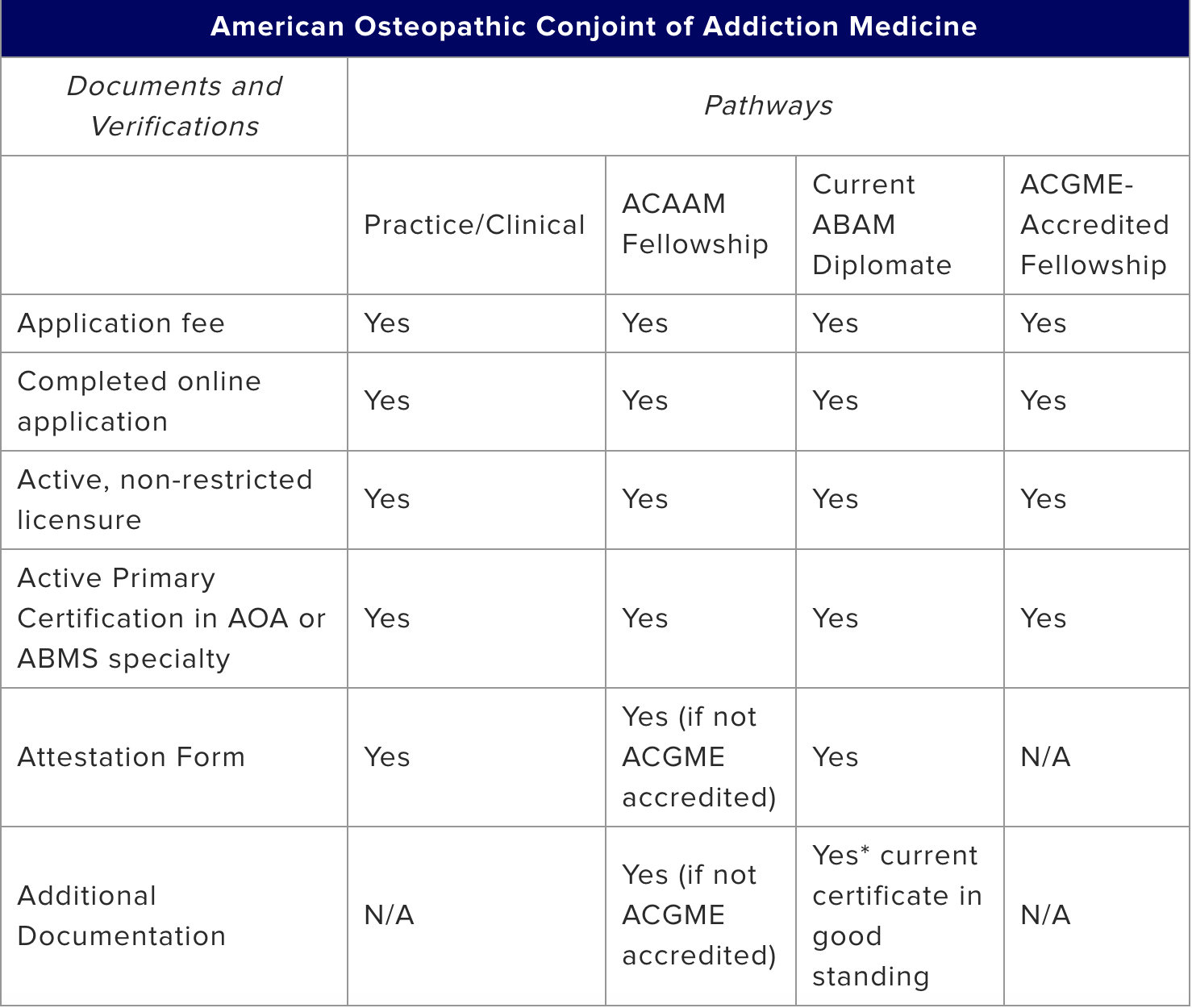Recognizing our nation’s opioid crisis as a public health emergency, in July 2019 the American Osteopathic Association (AOA) House of Delegates approved the development of a clinical practice pathway to facilitate subspecialty board certification in Addiction Medicine. These FAQs summarize options for Addiction Medicine certification, as well as their respective eligibility requirements, and will be updated on a periodic basis as additional information becomes available.
A physician can obtain subspecialty certification in Addiction Medicine through the American Osteopathic Association (AOA) or through the American Board of Preventive Medicine (ABPM).
The AOA offers the following four options to board certified osteopathic physicians in any AOA or ABMS primary specialty:
- Osteopathic physicians who have completed an AOA or ACGME accredited fellowship training in Addiction Medicine.
- Osteopathic physicians who currently hold an active American Board of Addiction Medicine (ABAM) certification.
- Completion of an American College of Academic Addiction Medicine (ACAAM) (formerly The Addiction Medicine Foundation {TAMF} and ABAM) fellowship will be recognized if the fellowship was completed within the five years prior to the application.
- Clinical Practice Pathway
The ABPM offers the following two options:
- Osteopathic physicians who have completed primary certification from an ABMS board can qualify either by completing an accredited addiction medicine fellowship or by satisfying the requirements of its clinical practice pathway (the ABPM clinical pathway is open through 2021).
- Osteopathic physicians who have completed primary certification from an AOA board can only qualify for ABPM subspecialty certification by completing an accredited addiction medicine fellowship.
Eligibility criteria for allopathic physicians to pursue AOA subspecialty certification in Addiction Medicine is currently under review by the AOA Bureau of Osteopathic Specialists (BOS).
Clinical Practice Pathway: Osteopathic physicians may submit an attestation describing their scope of practice, practice environment, and role as a healthcare provider in Addiction Medicine. Applicants must attest that a minimum of 1,000 hours of practice within a two-year period were engaged in the practice of Addiction Medicine. It is not required that the minimum of two years of practice be continuous; however, all practice time must have occurred in the five-year period prior to application.
- a. “Practice” consists of most professional activities with significant responsibilities in Addiction Medicine. Addiction Medicine practice outside of direct patient care, such as published research, teaching activities within an accredited medical school or ACGME residency and live or recorded live CME activities shall count toward a maximum of 50% of the required 1,000 hours of practice. The remaining 50% must be spent providing direct patient care. The attestation must include a signature from the candidate’s supervisor or peer, confirming the attested hours, role, scope, and environmental characteristics.
The following table details the documentation needed:

The clinical practice pathway will remain open for a period of three (3) years following the first administration of the initial exam. After the three-year period is concluded, physicians will only be able to qualify for subspecialty certification in Addiction Medicine by completing an ACGME accredited addiction medicine fellowship.
The first examination administration will be held Dec. 7-13, 2020. Additional details are available on the Addiction Medicine website.